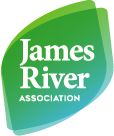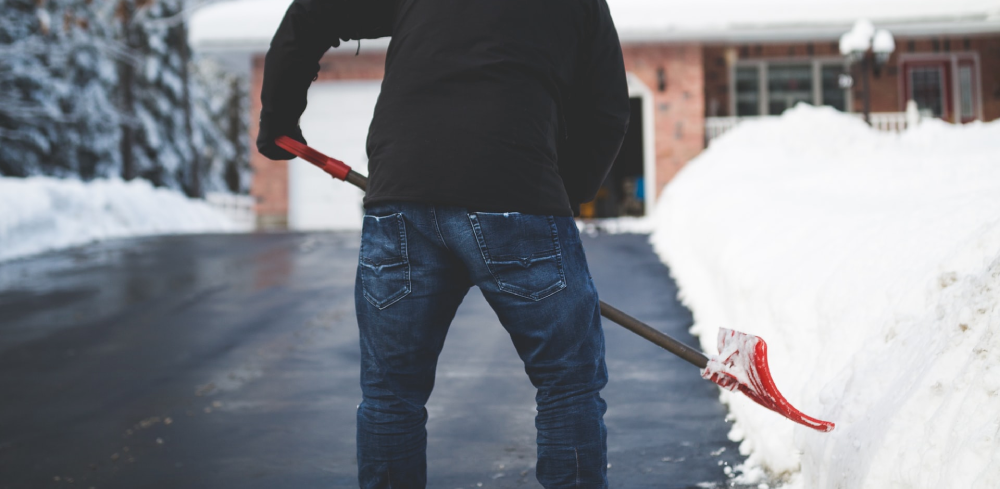Road salt pollutes local waterways and harms aquatic ecosystems
The winter months bring us cold temperatures and wintry precipitation like snow, sleet, and freezing rain that can make paved surfaces and sidewalks hazardous. Each year, transportation departments across the United States use millions of tons of road salt to de-ice roadways. Salt is also used to de-ice parking lots, driveways, and sidewalks. Add it all up and that’s A LOT of salt! In fact, it’s too much salt for bodies of freshwater like the James River.
Did you know that one teaspoon of salt is enough to pollute five gallons of water?!
Salt pollution in bodies of freshwater including rivers, streams, and lakes is increasing across the United States and around the world. Stormwater runoff is a significant source of salt pollution in urbanized areas. (1) Deicing products, many of which include sodium chloride, make their way into waterways via stormwater runoff and groundwater infiltration. As a result of this pollution, the function of local waterways is impeded, local groundwater is salinated, and soil structure can be altered. Aquatic species that depend on unpolluted freshwater to thrive can be negatively affected by salt pollution. (2)
One of the best ways residents of the James River watershed can reduce salt pollution at home this winter and contribute to a healthy James River is by skipping the salt. Instead of applying deicing products to driveways and sidewalks during wintry weather conditions, consider using a snow shovel to manage snow and ice. If traction is a concern, consider using bird seed instead of sand. Simply skipping the salt this winter will go a long way in protecting the aquatic ecosystems of the James River and its tributaries.
Tips for River-Friendly Snow and Ice Management at Home:
- Use a snow shovel. Using a snow shovel instead of deicing products, such as sodium chloride or calcium chloride, is the most river-friendly way to manage snow and ice at home. Shovel snow frequently to avoid the need for deicing products.
- Apply bird seed to sidewalks and footpaths. While sand is frequently used to improve traction, it can contribute to local water quality degradation and aquatic habitat loss. Bird seed is a good alternative to deicing products and sand.
- Be wary of “environmentally friendly” claims on deicing products. Deicing products may not be as environmentally friendly as they claim to be. If you absolutely have to use them, use them sparingly. Products with calcium magnesium acetate (CMA) are a more environmentally friendly option due to their higher effectiveness requiring smaller applications.
- Avoid using snowblowers. Two-stroke snowblowers emit harmful emissions and are noisy.
- Take the Salt Watch Pledge. Take the Issak Walton League’s Salt Watch Pledge and receive a free kit with everything you need to determine if road salt pollution is a problem in your local stream.
Join the James River Association’s River Hero Homes program!
River Hero Homes is a community of stewards that realize the first step to a cleaner James River starts at home. Residents of the James River’s 10,000 square-mile watershed take a pledge and commit to adopting a minimum of three of the following five conservation actions.
- Scoop the poop. Pick up pet waste to prevent bacteria pollution.
- Use native plants. Use regionally native plants and remove invasive plants in gardens and landscapes.
- Reduce herbicide and pesticide use. Reduce or eliminate herbicide and pesticide use to promote a healthy ecosystem.
- Reduce fertilizer use. Reduce or eliminate fertilizer use to reduce nutrient pollution entering our waterways, and encourage healthy soil by using compost.
- Conserve water. Reduce household water use and install a rain barrel to harvest rainwater for watering needs if possible.
River Hero Homes would not be possible without generous support from Altria and DuPont Clear into the Future. Their support allows us to promote conservation and stewardship practices that support a healthy James River. Click here for more information about River Hero Homes, and become a hero for the river today!
Resources:
- Freshwater salt pollution threatens ecosystem health and human water security https://news.vt.edu/articles/2021/04/04-15-21-Fralin-Life-Sci-Nature-Sustainability-salt-pollution.html>
- Athena Tiwari and Joseph W. Rachlin, “A Review of Road Salt Ecological Impacts,” Northeastern Naturalist 25, no. 1 (March 1, 2018): 123–42, https://doi.org/10.1656/045.025.0110.


